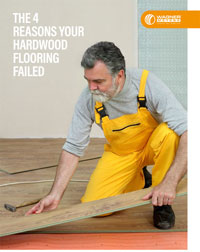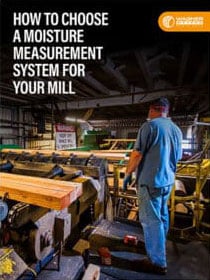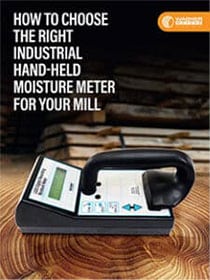Hardwood Flooring Installation and the Tools You Need to Know
Previously published by Floor Covering News
Hardwood is one of the oldest and most widely used premium flooring types, and its popularity is increasing. In the United States today, sales of hardwood flooring products are approaching $4 billion yearly.
But on the downside, more than $500 million is spent each year on repairing flooring failures, and since hardwood accounts for about 10% of flooring installations, that’s probably about $50 million lost to hardwood flooring failures. That means it’s in your best interest to take precautions on every job to minimize the risk of failure.
This article looks at the essential tools for hardwood flooring installation, and especially the tools you need to ensure that your risk of failures is low.
Tools of the Trade
First things first, and that means safety. Before you do anything else, be sure you have the equipment to protect yourself and others on the job site. There are many hazards you need to be aware of, including power saws, noise, dust, fumes from volatile products, fastening tools, even hand tools like hammers and knives. That means you need safety glasses or goggles, earplugs or earmuffs, dust masks, a respirator, heavy duty gloves, and safety boots. To save your knees from some serious bruising, you’ll need knee pads.
Next, you’ll need the tools for installing the floor. Read this article for a list of 24 essential tools every flooring contractor should have on hand when installing a hardwood floor.
Protect Your Investment
Besides the tools for installing the floor, you need tools to minimize the risk of floor failures. The worst enemy of a wood floor is excess moisture, which can come from a wood or concrete subfloor, the ambient air, or the flooring materials. Excess moisture can cause cupping, crowning, gaps, buckling, and squeaking.
To protect yourself from liability and callbacks, you need the proper tools to measure moisture. Moisture must be within acceptable limits in the subfloor, the flooring system you’re installing, and in the ambient air both during and after the installation.
Before you begin, make sure the subfloor has been tested for moisture. If you’re installing over a concrete subfloor, ensure that you possess ASTM standard documentation that proves the concrete has been tested for the correct moisture conditions. You may be able to get this from the General Contractor, or you may have to conduct the testing and document the results yourself. Wagner Meters offers an easy-to-use and quick concrete moisture test system that fully complies with ASTM F2170 so if there’s a failure after your installation due to excess moisture from the subfloor, you can prove that the problem isn’t with your work. If you’re installing over a wood subfloor, the situation requires the same documentation to protect you against liability associated with moisture-related flooring failure.
Next, use a pin or pinless wood moisture meter to make certain that your flooring system materials have been properly stored and acclimated before you begin the installation.
If you’re properly equipped for your installation, you’ll have a high-quality wood moisture meter that can also be used on the subfloor.
A dual-depth moisture meter can be adjusted to the thickness of the material you’re testing, so you can use it to accurately test both the subfloor and the flooring materials before and during installation.
Moisture meters come in both pin and pinless designs. Both types are accurate if used properly, but pinless meters have some important advantages. First, pinless meters don’t damage the floor. Pin-type meters use metal pins that must be pushed into the wood, which mars the surface. A pinless meter rests on the top of the wood and determines moisture content, in the wood, with an electromagnetic wave pattern.
Pinless meters are also faster and easier to use. There’s no time wasted pushing the pins into the wood, and because they use an electromagnetic field to measure moisture, they can measure a much larger area than with a pin meter. You can quickly scan your entire floor in much less time.
The Orion® 930 dual-depth pinless moisture meter is among the most accurate in the industry and features on-site calibration to ensure that your meter delivers the same level of accuracy throughout the life of the unit. This is an industry first in that you never have to send the meter to the company for calibration. This makes the Orion an excellent choice for floor installers.

Free Download – 4 Reasons Your Hardwood Flooring Failed
After the installation is complete, it’s important to ensure that the correct ambient conditions are maintained in the space. If the ambient conditions aren’t maintained properly, the moisture content of the flooring system can change causing dimensional changes to the floor. Even if you’ve done your job and kept moisture conditions right, the client can cause damage to the floor by not maintaining the proper service conditions after the floor is installed.
You can help prevent this problem by monitoring and recording the ambient conditions in the space after the installation. Unfortunately, this can be difficult and time-consuming. It requires you to return to the site repeatedly, so it’s inconvenient for both you and your client.
However, there’s a much better way to do this, utilizing the latest technology. Wagner Meters offers the Smart Logger™ which provides constant monitoring and recording of ambient temperature and relative humidity, 24 hours a day, even when you’re away from the job site. You can configure it using the Smart Logger app on your Bluetooth® mobile device to collect and store readings on a regular schedule, then return to the site to download the data to your mobile device. The all-digital system means no manual data recording mistakes and ensures the highest data integrity.
Premium Tools Give You Premium Results
A successful flooring installation requires the proper tools for installation and the tools to ensure proper moisture conditions. Professionals are only as good as their tools, and premium tools mean premium results. Any successful flooring installation can be undone by moisture that went unnoticed because of inadequate tools. A high-quality pinless dual-depth wood moisture meter like the Orion 930 offers significant protection for your investment.
Jason has 20+ years’ experience in sales and sales management in a spectrum of industries and has successfully launched a variety of products to the market, including the original Rapid RH® concrete moisture tests. He currently works with Wagner Meters as our Rapid RH® product sales manager.
Related Posts via Taxonomies
Last updated on May 4th, 2021



